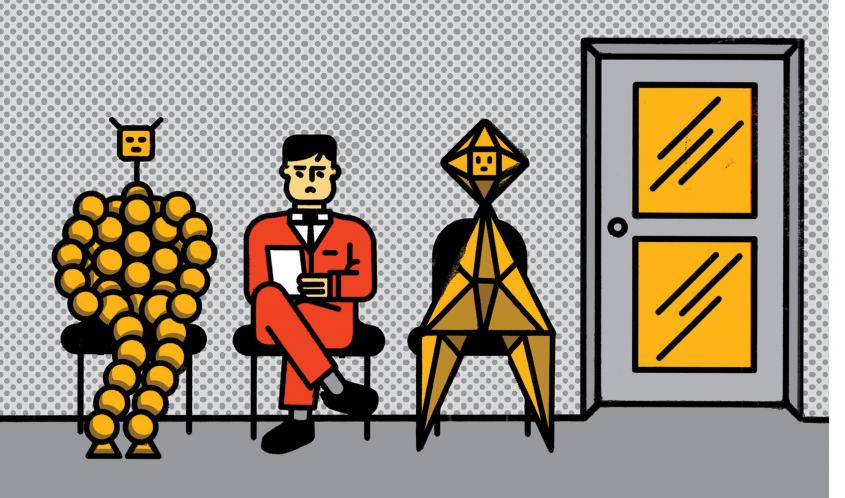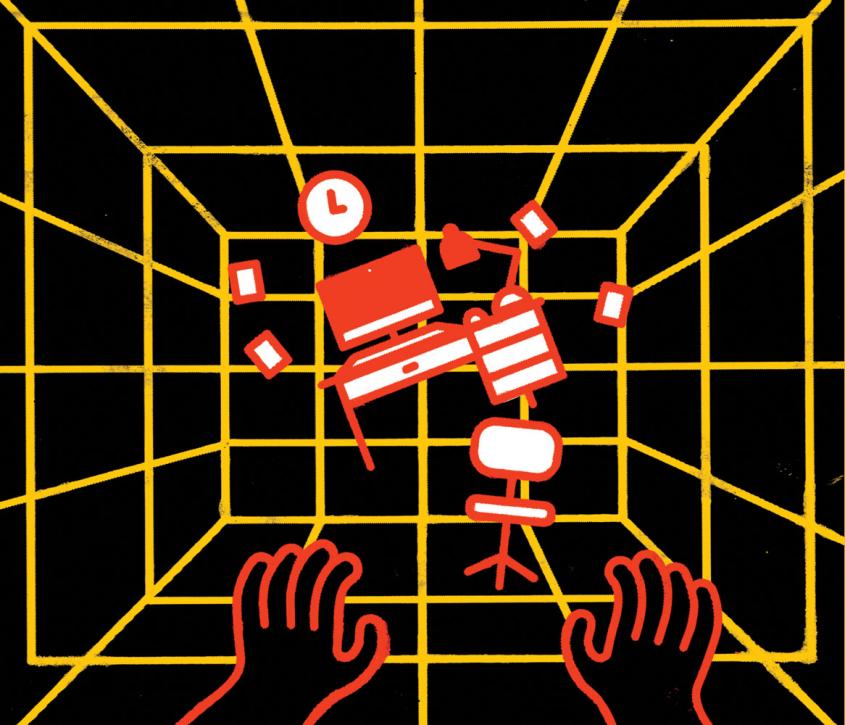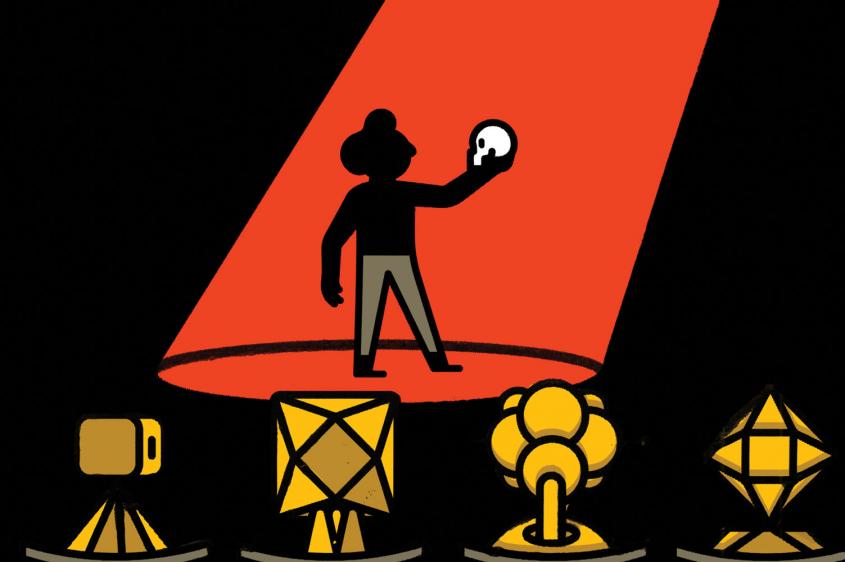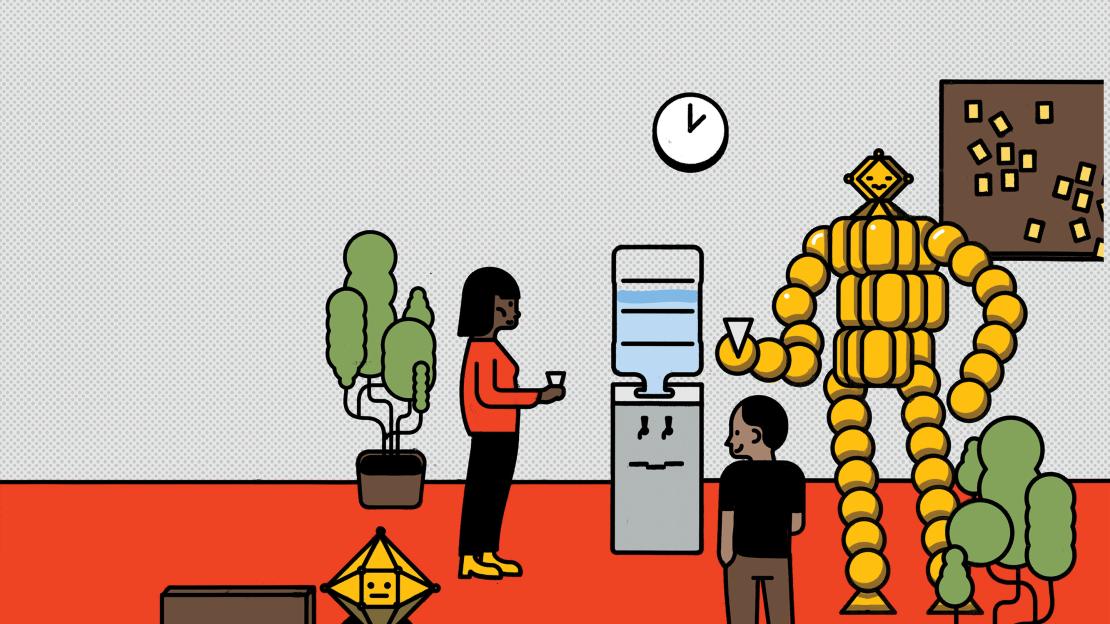Your current job could be replaced by artificial intelligence, your co-worker might be a robot and your future job may not exist yet. But your prospects are better than ever.
Alexa, Siri, Cortana, Google Assistant. Born of AI and automation, the enablers, the assistants of the future. Big data, the Internet of Things and smart things – watches, homes and cars. Robots. They’re for sure coming to take our jobs.
Everyone from lawyers and accountants to reporters and editors should watch their backs. Insurance underwriters and loan officers, too.
There are other forces at work. “Since the 1990s, globalization and the weakening of national borders, along with corporations capitalizing on finance, trade and production, changed the nature and the future of work,” says Ahmed Allahwala, associate professor, teaching stream, in the Department of Human Geography.
Not that people are obsolete. McKinsey & Company, a global management consulting firm, estimates it will take two decades before automation touches 50 per cent of all of today’s work activities.
So we’ve still got at least a good 20 years.
For the career-stressed, there’s this: years ago, many of the jobs of today didn’t exist 20 years ago. App developers, UX designers, genetic counsellors, social media managers and music therapists weren’t even on the radar. You couldn’t surf the Web. No bingeing Netflix or streaming music. No YouTube, Facebook, Pinterest or Instagram or fitness trackers. No texting or GPS. Podcasts, and Skype weren’t even words.
Somebody had to come up with all those things – and it wasn’t a robot.
Forces at Work
Workplaces are changing, and global forces have a big impact on the job markets now. “It’s important to diversify,” says Ryan Isakson, assistant professor in the Centre for Critical Development Studies. “In our courses, we have a fantastic mix of students who are in geography, environmental science, anthropology and sociology – it’s good for students to look through a broader lens to stitch together connections from across disciplines.”
The Centre attracts a certain idealized student, with a vision of a better world, says Isakson. And it works in their favour. “Graduates tend to work for organizations that value a commitment to employees,” he adds.
One of the major issues facing graduates is the gig economy, or precarity. “The biggest shift that has happened is people moving from being employees to being contractors,” says Maggie Cummings, assistant professor in Anthropology. “People may even work for the same company but are now being paid by a subcontractor. There’s an inherent lack of stability built into that – and graduates have to look at how to mitigate that.”

Students need to realize that these are structural forces beyond their individual control. “It’s not because they have the wrong degree and or that they didn’t work hard enough,” says Cummings. “It’s a good idea to support skills with hands-on learning, such as project-based learning co-ops.”
Which is exactly what U of T Scarborough does. “It allows the student to see beyond the classroom and take ideas they’ve learned into the real world,” says Isakson. The co-op program gives students opportunities to go abroad. “That’s one thing that will serve students well in the future,” he adds.
What’s coming down the pipeline? “Well, it’s hard to imagine that we will be more ‘gigified’ than we are already,” says Cummings, who points out that we are at an interesting point and it could all go the other way. She cites the example of the Ontario government raising the minimum wage this year. “Who knows? We could start to see a movement rethinking work in the gig economy.”
Let’s Start with STEM
There isn’t one area that hasn’t been affected by STEM (science, technology, engineering and math) and, over the next decade, many jobs will require STEM skills.
“The biggest societal shift is the mass migration of life to online platforms,” says Ashton Anderson, assistant professor in the Department of Computer and Mathematical Sciences. He likens this to the advent of the telescope. “It bettered our understanding of the cosmos and allowed us to gather more information,” he says. “Our vast computer resources and data are doing that now. The way we do everything is different: how people connect and how we shop and how we find romantic partners.”
Anderson believes that the future of work will require people to understand the language of data and coding; it will be a new kind of literacy requirement for many jobs. “That’s why computer science will be a fundamental skill,” he says. “One issue is that it could turn into a big divide: people who don’t know how to code, for instance, may become the new illiterate.”
Artificial Intelligence (AI) machine learning and deep learning are transforming industries at an increasing pace. “Individual applications of AI are all around us, from facial recognition on smartphones to uses in market predictions and machine translations. Google Translate is a good example of that,” says Graeme Hirst, professor of Computer Science. “We hardly even think of it as new any more.”
And then, even bigger, is the idea of General Artificial Intelligence (GAI), which will be the focus of many jobs in research, applied research and development. Hirst uses this example: Alexa and friends like Siri can search the Web for music, restaurants and recipes for you. In the future, it will be more intelligent, so you’ll be able to say, “Make a booking for next Wednesday at a Swedish restaurant with good reviews in Toronto.” But that’s not all. “You’ll be able to say, ‘Siri, you know all my financial details for the past year, please fill out my income tax return.’ We’ll get there very quickly,” he adds.
Individual applications of AI are all around us, from facial recognition on smartphones to uses in market predictions and machine translations. Google Translate is a good example of that,” says Graeme Hirst, professor of Computer Science. “We hardly even think of it as new any more.
One area poised to grow significantly over the next decade, as we look for new ways to save the planet, is environmental science — and there are so many different careers in the field. “The unfortunate thing is that environmental science is very disconnected with high school students,” says George Arhonditsis, professor and department and graduate chair of the Department of Physical and Environmental Sciences. “They don’t really understand what it is and don’t realize, until second or third year, what is available in this field,” he says. “But one thing we are very proud of is how our graduate program is growing and that our students are very successful landing great jobs after graduating.”
The master’s program started in 2006 with about 15 students, and now there are more than 250 applications every year. The job prospects are excellent, Arhonditsis points out, “with 100 per cent success in placing every student for an internship, many of them paid internships that lead to full-time employment.”
 Humanities in a STEM world
Humanities in a STEM world
In the face of all the emphasis on STEM, it’s sometimes easy to forget that it all started with the study of humanities – history, philosophy, art, literature and music. “There’s so much talk about automation and mechanization but you don’t have to be a robotics major to know that creativity will be the last thing a robot will be capable of,” says Andrew Westoll, assistant professor, teaching stream, in Creative Writing and English. “That’s what makes the humanities absolutely vital. The ability to listen, to argue a point and to articulate an imaginative concept is crucial in the employment market.”
Westoll suggests students should focus on their passion and think about what they want to do six months to a year down the road, not what they think they should be interested in 10 years later, because you just don’t know. Actually, he’s an excellent example of what he’s talking about. “Take it from me – I’m a science major, now teaching English.” He’s also an award-winning author and journalist.
Recently the English department organized an alumni panel to speak to students. Alums in publishing and education talked about how they used their degree to get into fields like law, medicine and government. “I think what we’re seeing is an evolution toward entrepreneurship across fields in unique ways,” says Katherine Larson, associate professor and chair of the Department of English, citing the example of a graduate student who is combining a degree in Biological Sciences and English, then went on to medical school, where she continued her interests in using storytelling in therapeutic treatments in a hospital setting.
U of T Scarborough itself is unique, Larson points out, as it is a large institution that encourages students to follow their interests in a range of paths. “The co-op program places students in an industry, and even if they are not working directly in their study area, they are getting practical experience,” she says. For her, it’s important to show students, especially young women and other historically marginalized students, the opportunities that are available. “It’s important for them to see other women as faculty members, as researchers serving in leading roles. It’s one of the reasons I took on the role of chair,” she adds.
Many students come into university and they’re just not sure which way to go. “They love making music and performing, but they’re concerned they won’t get a job,” says Lynn Tucker, associate professor and acting chair in the Department of Arts, Culture and Media. However, they don’t have to decide, she says. “We are all human with varied interests – I have so many computer science students in the band, others are picking a music minor or doing a double major,” she says. “And there are opportunities connected to careers. If someone loves computer games and the epic soundtracks that go with the games, why not do both?”
Tucker points out that some students in health sciences are interested in combining their degree with music courses to go on to pursue arts-based and music therapy work. In fact, one student with a degree in psychology who was engaged with the music program (through the Concert Band) is pursuing the intersections of these two fields in graduate studies at U of T’s Institute of Medical Sciences.
Social Sciences: Be Open and Be Prepared
We all know work is changing but the future could hold creative solutions. “Take some of the work trends coming out of Scandinavian countries,” says Ahmed Allahwala. “They are reducing the number of hours that people are working to allow more free time and to redistribute work.”
His tip: Any form of experiential learning that gets students out of a classroom and into a work setting is valuable. “As students engage in these actives in the real world, they learn co-operation and teamwork skills,” he says. “It’s added value, as students come out of university already networking.”
In a push to prepare students for work, the humanities are suffering. Case in point: In a bid to lure Amazon to Toronto for a second headquarters, the provincial government has pledged to invest $30 million to boost the number of graduates in science, technology, engineering and mathematics (STEM) programs, and graduate students studying artificial intelligence (AI). “But the ability to think independently and critically, to engage in debate, to work with ideas that are relevant in socio-political issue has tremendous value,” he adds.

That’s exactly what students get in the City Studies program, says Alexandra Flynn, assistant professor in Human Geography. “The program is in a unique position at the university,” she says. “We’re able to use our surroundings as a lab for our courses, we’re in range of many different municipalities.” In addition, Flynn adds that the skills the students learn in the co-op program will be relevant and applicable whether they go on to work or to graduate school.
“I think the more that students are asked to take risks, the more they gain confidence and that leads them open to different opportunities,” says Flynn. Like this entrepreneurial idea: a fellow student of Flynn’s graduated with a law degree but had few prospects. She ended up starting an online tech company providing legal services. It was something the community needed, and the law firms weren’t doing it.
What All of This Means for the Future of Work
Inevitably technology will replace some jobs, but even then, we will need to hire people to work alongside the computers. “A lot of accounting students are worried because AI can handle basic accounting functions but companies will still have to hire people to manage the software and check the work,” says Jen Davies, manager, career development at the Academic Advising & Career Centre.
There are some things a computer program just can’t replace – skills that we value as humans: the ability to empathize, for example. Although technology can enable creativity, creativity or imagination can’t come from a computer. “That empathy, that emotion, that human experience of merging with the experience of everyone else in a classroom, that’s magical,” says Westoll.
None of that is coming from a robot.
